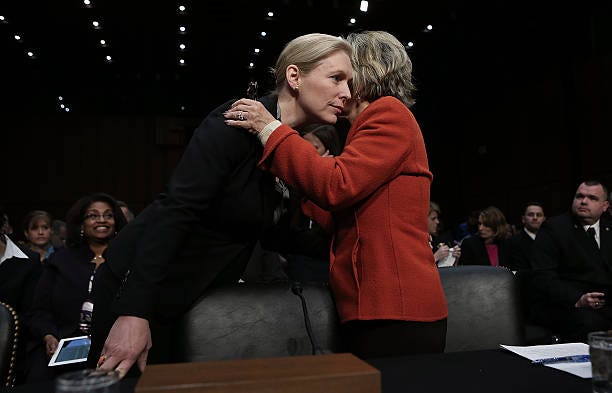Major Military Reform in Sexual Assault Cases
An independent Pentagon panel proposal, that would give civilian prosecutors power to pursue sexual assault cases in the military, proves the age-old adage that elections really do have consequences.

In a longstanding break with military policy, a special Pentagon review panel now says independent judge advocates, not commanding officers, should decide whether or not to pursue legal charges in sexual assault cases — a change long sought by members of Congress.
Advocacy groups, that include several congressional Democrats, have been seeking reform in this arena for years, arguing that military commanders are inclined to overlook accusations of sexual misconduct in favor of keeping established personnel and customs in place. Those in favor of reform say that independent prosecutors, who are experienced in charging and litigating these issues, would be more appropriate and much more likely to pursue repeat offenders.
The recent push for change in sexual assault and harassment cases is another bi-product of Democrats’ successful run-off elections in Georgia and their slim majority in the Senate. In February, thanks to the two Democratic wins in the Senate, the upper house approved the recommendation to evenly split power within the Senate Armed Services Committee with a power-sharing arrangement.
Ranking member and chairman of the committee, Sen. Jim Inhofe, (OK-R), who became the longest-serving Senator on the committee following the 2018 death of John McCain, would move into the position of ranking member. Democratic Senator Jack Reed (RI) was to take Inhofe’s place as chairman of the Senate Armed Services Committee.

Following this new committee power-sharing arrangement, Senator Reed issued the following statement: “Over a decade or more we have tried different approaches to limiting sexual assault, sexual harassment and also retaliation, and we haven’t seen the progress that we hoped — and so I think the idea of separation is once again on the table.”
Now that the Pentagon panel has formally recommended such a seismic shift in how the US military would proceed with handling sexual assault cases, the Senate Armed Service Committee is now structured in a way that can effect change. A seismic shift in the nature of military legal practices would run counter to years of established military practice — the Pentagon resisted the idea of taking sexual assault cases outside of the typical chain of command for years.
The number of sexual assaults reported in the military has continued to rise. The epidemic reached crisis proportions in 2019, when the Pentagon confirmed that approximately 20,500 soldiers — 13,000 women and 7,500 men — had experienced some form of sexual assault while serving in the military. That astounding number of reported assaults in 2019 was 37% higher than the previous full report conducted only two years earlier in 2017.

According to two senior defense officials, a newly implemented system would affect only a small fraction of the wide range of military discipline cases that commanders regularly handle. The Pentagon panel is also recommending that sexual harassment claims be investigated outside the chain of command — if a charge is substantiated, the military should immediately begin discharging that person from the force while other legal proceedings continue.
The panel’s deliberations at the Pentagon were driven by a loss of faith in the system from service members and the importance of restoring confidence in the military with change. Although the new system would require an increase in funding and staffing, those numbers are not yet known, but one primary justification for any increase in costs is the hope that the new system will increase reporting by victims of sexual assaults.
Sen. Kirsten Gillibrand (D-NY), who has now advanced as the Senate Armed Services Personnel Subcommittee Chair, which has jurisdiction over military justice and matters relating to active and reserve military personnel, has advocated for a significant military change in the approach to prosecuting sexual assault for years.

After newly elected President Biden ordered a review of the problem in February of this year, Sen. Gillibrand and Rep. Jackie Speier (D-CA), who heads the House counterpart of the Senate personnel subcommittee, urged the president to assume control of the Pentagon panel to combat "routinely stacked similar panels with members who will toe the Department's line."
Accountability for sexual assault in the military "is vanishingly rare," Gillibrand and Speier explained in a formal letter of request. They also reiterated that despite the high number of reported cases, fewer than 670 courts-martial were initiated for sex-related offenses in 2018, with only 203 resulting in convictions.
The Pentagon's independent commission, led by Lynn Rosenthal, the Obama administration’s advisor on violence against women, was asked by the Defense Department to come up with "bold action” on this issue. The goal was to improve the approach to sexual assault and harassment cases in the military to prevent incidences of abuse and enforce accountability.

The decision of whether to put the panel's recommendations into practice now rests with Defense Secretary Lloyd Austin, who was placed in his position on the Independent Review Commission on Sexual Assault in the Military by President Biden.
"Sexual assault and harassment remain persistent and corrosive problems across the total force," Austin said when announcing the creation of the independent panel. "I expect every member of our total force to be part of the solution and leaders — both civilian and military — across the Department to take direct accountability to drive meaningful change."
We often hear the colloquialism “elections have consequences,” and we have suffered certain realities pointed out by the idiom and emphasized by the Trump administration for the last four years. Many of us understand the meaning and importance of the phrase, but rarely are we given insight into the exact details that prove how elections can reform policy for the better.

"This is a broken system that punishes victims while allowing most perpetrators to escape any consequences for their actions," both Gillibrand and Speier explained in their letter to President Biden. Thanks to Georgia, tenacious Congressmembers, dedicated experts, and a new president, we can see the bigger picture of how powerful this expression truly is and how important one person’s vote can be.
Amee Vanderpool writes the SHERO Newsletter and is an attorney, published author, contributor to newspapers and magazines, and analyst for BBC Radio. She can be reached at avanderpool@gmail.com or follow her on Twitter at @mamasreallyrule.
Paid subscriptions and one-time tributes embedded in each article allow me to keep publishing critical and informative work that is sometimes made available to the public — thank you. If you like this piece and want to support independent journalism further, you can forward this article to others, get a paid subscription or gift subscription, or donate once, as much as you like today.




LONG OVERDUE.
It’s way past time for this change.